 Last Sunday, on the occasion of the impending release of her new film, Lost in Translation, I joined a couple of journalists in a group interview with Sofia Coppola. The interview took place in New York City at the end of her press junket. I found the suites capacious, the sofas commodious, the sandwiches copious. "Big Brother" was hanging around, but he rebuked us; Roman stayed mostly near the buffet.
Last Sunday, on the occasion of the impending release of her new film, Lost in Translation, I joined a couple of journalists in a group interview with Sofia Coppola. The interview took place in New York City at the end of her press junket. I found the suites capacious, the sofas commodious, the sandwiches copious. "Big Brother" was hanging around, but he rebuked us; Roman stayed mostly near the buffet.
Not being a reporter, I failed to get the names of my interviewing colleagues. So rather than use their uncredited questions and responses, I've replaced one with Lynn Hirschberg and another with Official Questioner, and spliced in relevant replies from the NYT Mag and official movie website, respectively. In Hirschberg's case, no questions were available, so I made that sh$* up interpolated them myself.
The third interviewer, a slightly kooky, festival-hardened critic-without-portfolio, was too good to leave out. I have renamed her Barbara Walters. Her questions are left intact, cuz you just can't make that sh*% up.
Greg.org: What IS good this year?
Official Questioner:: It's just a bad summer. I mean, even Spy Kids 3 is going to clear $100 million in two weeks.
Barbara Walters: Spike Lee has a movie out?
Awkward silence descends. Sofia enters and joins our table. Cue greetings. We all feel protective of her immediately, just like Wes Anderson predicted.
Read my Sofia interview here
G: How did you get the idea for a movie in Tokyo?
SC: I spent a bunch of time in Tokyo in my early and mid-20's, doing work and different things. So I'd been there a bunch, and thought, I really want to do a movie here someday. I just loved the way visually it looks and the mood. I've never been in another place where I really felt like it's another planet. And then you're jet-lagged on top of it. To me it was a unique experience.
G:The script's full of these quintessential Tokyo moments. Did you do a lot of "research" for that? [to self]like "location scouting" all those clubs and hanging out in a swanky hotel for weeks on end?
SC: That came from my time there, just my interest in it, from meeting people, having friends there, and having them take me around to places I would never have been able to find if I didn't know someone there. There's something about going into an office building and going up to the tenth floor and all of a sudden you're in a little bar that you'd never know about.

OQ: Friends?
SC: My friend Charlie Brown always takes me around. That's his nickname; his real name is Fumihiro Hayashi. I met him a long time ago and he has a fashion magazine there [called Dune, which looks like it should be called Sofia]. Charlie is in Lost in Translation, he sings "God Save the Queen"; he always sings that, and that was one of the first images I wanted to make a movie around.
G: And the hotel with the oh-so-mellow jazz band, Sausalito?
SC: And for the hotel, the Park Hyatt, I went there the year before, and kind of wandered around the hotel, took notes, saw the aquaerobics class, and the jazz singer--the red-headed woman, she's the real singer in the hotel bar. One night, late, before shooting, we went there, and she was singing "Scarborough Fair." In Tokyo. In the New York bar in Shinjuku, this woman's singing "Scarborough Fair." One of the things I love about Tokyo is this weird mixture of western cultures.
src="http://pagead2.googlesyndication.com/pagead/show_ads.js">
G [to self]: The thing that really stands out about the hotel scenes is the ambient sound. It's supposed to be totally silent, but there's always a ventilation fan, or an electrical hum in the background. After the screening, I went home and watched Soderbergh's Solaris, and there was that same sound on the space station. In fact, the space station looked slick, a bit like the Park Hyatt.
G [to Sofia]: Bill Murray's performance rocks, and it seems very off-the-cuff in parts. How'd you write that, and what'd it look like on the page?
SC: Well I wrote the movie with him in mind--in that part--so a lot of when I was writing, I was saying, "What would Bill Murray do?-- I was picturing him-- so that kind of informed it. And he is a great improviser, and I knew he would bring a lot to it, which is why I wanted to work with him.
G: That scene with the Japanese photographer is great, for example. How'd you do that?
SC: The way we did that scene, Naka is a real photographer, and we'd just whisper people's names into his ear--like Roger Moore and Sean Connery--and he would say it, and Bill would react, so Bill'd never know what we were going to throw at him. It was really fun to watch him react and work like that, though.
LH: From my vantage point on the set of your Kate Moss pole-dancing music video, it looks like you enlisted your hipster friends to get Bill Murray on board.
SC: People said, 'You need to have a backup plan,' and I said, 'I'm not going to make the movie if Bill doesn't do it.' Bill has an 800-number, and I left messages. This went on for five months. Stalking Bill became my life's work.
G [to self]: Hmm. Sounds like this website where people post excruciatingly sincere messages to Bill.
BW: You studied at Cal Arts, not USC or UCLA, and before making films you were a photographer.
Pause.
SC: Um, yes.
BW: The way these questions get reordered, you're going to mention Kurosawa later, in a completely different context. Have you seen a lot of Japanese films to get the mood or learn about Japan?
SC: You know, I haven't seen that many Japanese films; I saw Kurosawa's films as a kid...
BW: Hiroshima, Mon Amour?
SC: You know, I love the title, but I've never seen it.
G [to self]: Not a Japanese film, Barbara. I do believe it's French. Some guy named Resnais...
OQ: How about your title, Lost in Translation?
SC: That came after. I didn't have a title while I was working on it. Someone suggested Hiroshima, Mon Amour, but it was kind of a Tokyo story [as opposed to Ozu's Tokyo Story, I think. -G.]. Then I thought of Lost in Translation, which I really liked. Itís like a book.
G: Those scenes with the Japanese director were hilarious. Did you write that dialogue or just tell him to say whatever?
SC: Yeah, I wrote the dialogue and had it translated, but I don't remember what he actually says now.
G: What he was saying was just hilarious. I got kind of embarrassed because I laughed out loud in the screening.
SC: Oh, that was you?
G: Yeah.
SC: You speak Japanese?
G: Yeah.
SC: Well, I haven't seen it with a Japanese audience yet, but Ross [Katz, the producer] has, and he said they laughed in that part, too, so that's good to know.
G: Have you had experiences like that?
SC: I was in the Park Hyatt doing interviews for Virgin Suicides with a translator. I'd answer the question with a sentence, and she would translate and it'd be, you know, five minutes longer, and you start getting paranoid, wondering, is she getting carried away, is she adding to it? Then later, she explained that the language is longer, and it's got more formality, but it's just one of those oddities.
G [to self]: Dude, that translator totally spoofed you.
[to Sofia]: Oh, that's so true. You said you had this collection of experiences that you'd wanted to put on film someday, like your friend Charlie Brown's karaoke. Is that something you do on an ongoing basis, like you have a camera rolling in your head and say, I'm gonna use this someday?
SC: I don't think I'm consciously always thinking that, but sometimes someone'll say something, and I'll think, "Oh that's crazy," then later when I'm writing, it'll come back to me. but I'm not always taking notes for a movie.
G:Was there a point, then, when your experience in Tokyo congealed and you said, this is the core of a film?
SC: It was more just the city. Visually, it was so beautiful. I remember driving home one night in a taxi, seeing the city going by, listening to music, and thinking I wanted to shoot it.
G:Are there other filmmakers you're inspired by, somebody's vision of Tokyo you had in mind when you first went over there?
SC: No I hadn't really seen it in a film like that, but there are definitely movies that I loved.
G: Like the Wim Wenders documentary with Yohji Yamamoto? [A Notebook on Clothes and Cities, which is excellent, by the way]
SC: No, I've heard about that; I really want to see it. I definitely watched certain movies when I was working on this: L'Avventura, and on the plane on the way to Tokyo, Roman Holiday was playing, and I remember thinking, oh there's something related to that.
G: And you had the characters watching La Dolce Vita on the bed in the hotel.
SC: Yeah, that's another movie I thought of, one that's not plot-driven, that's about them wandering around. And being in Tokyo kind of reminded me of that, with these international people, like some Japanese guy speaking French, and someone from London. Actually, I saw Dolce Vita on TV when I was in Japan, and there was something with Japanese subtitles, and them speaking Italian, I don't know, it had a very enchanting quality.
OQ: There's a lot of autobiographical elements in this film.
SC: It's not directly autobiographical; I didn't have that experience [of hooking up with a washed up actor in a luxury hotel, I guess], but there is definitely parts of me in all the characters, and it's based on some of my experiences, the experiences of my friends, which I combined.
I've definitely been in that situation where you're kind of tagging along, where they're working and you're not. Not specifically like Scarlett, though.
G: Were the commercials a direct reference to Sean Connery's Suntory commercials?
SC: No, my dad and Kurosawa did a Suntory commercial. That's where the idea for the Suntory came from. They were both on camera, in the seventies. I never saw it; I saw a picture, framed, of my dad and Kurosawa sitting there. I think it was at a point in Kurosawa's career where he didn't have money, and so my dad was trying to be helpful, I guess.
G: What about Nick's pachinko commercials?
SC: Yeah, I've seen some of them. He was really funny.
G: Have you seen the one where he's singing at the piano?
SC: No.
G: I downloaded it. Do you want to see it? It looks a little like the Johnny Cash video.
SC: Sure.
We all watch the silly commercial, the audio of which drowns out Sofia's amused response.
LH: The relationship of the fashion photographer and his young wife may or may not have shadings of your own life and your relationship to Jonze. Giovanni Ribisi, who plays the photographer, speaks with Jonze's mannerisms, and Scarlett Johansson, as Charlotte, is dressed and styled to seem a lot like Coppola.
SC: I know. How narcissistic.
G [to self]: Waitaminnit, she said it wasn't like her own experience. And then Scarlett tells Lynn that Sofia tried on the underwear in the opening scene to show her how it should look?
Q [to self]: Gots to get the URL for the onset pics of Sofia in that underwear...
BW: What is this we've read about you and Spike? That you're breaking up and you moved into the Chateau Marmont?
SC: I don't know where they get this stuff in the Post. I mean, I like to read gossip, too. They said it was from a close friend or something? Do they just make this up?
Everyone (protectively, and in unison): Oh, they DO. They DO. [Sorry, Elizabeth, I don't know what came over me.]
OQ: What would you like audiences to take away from their experience of watching the film? A mood? A moment? A specific emotion?
SC: I can only say why I wanted to make the movie: to convey what I love about Tokyo and visiting the city. It's about moments in life that are great but don't last. They don't go on, but you always have the memory and they have an effect on you. That's what I was thinking about.
G [to self]: Hmm. You said almost exactly the same thing at the end of the Making Of video for Virgin Suicides. Now I'm starting to look at the end of Solaris differently. Why is that?
BW: Did you have a Buddhist phase?
SC (confused): Um, no.
G (helpfully): That was the Beastie Boys.
Lost in Translation premiered today at the Venice Film Festival. It opens in real cities in the US on Sept. 12. Beyond the ambient sound, the soundtrack also rocks.
Related:
Lynn Hirschberg's Smart Mob piece shows what kind of access writing for the New York Times can getcha.
A Q&A with Sofia Coppola and Ross Katz on the LIT website.
Buy the Lost in Translation soundtrack.

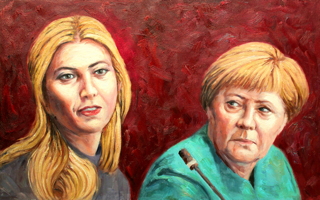

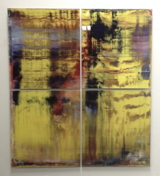

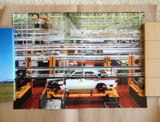
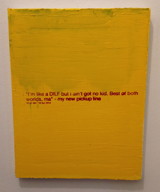
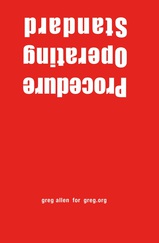
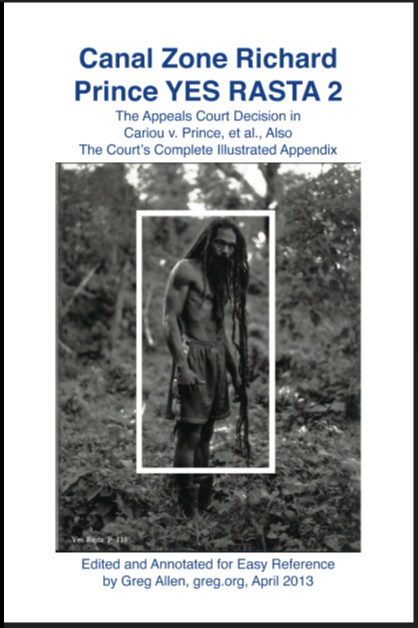
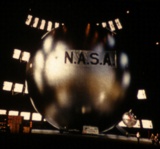
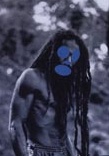
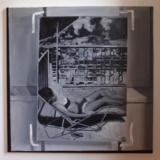
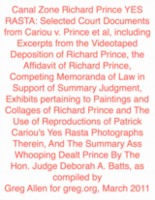
Very interesting interview. From the interview it seems Ms. Coppola's approach to her work is quite intuitive and re-active. Nice work.
I have written a screenplay, it's taken me over three years to complete (1st draft). Set in Australia. I would like to submit a copy to Ms. Coppola for her consideration. Do you know if she has a business agent I might contact? Thanks!
i THINKS, NO I AM SHURE THAT THIS MOVIES IS A PROLONGATION OF fRANCIS FORD COPOLLA MYTH (a M FROM FRENCH THAT WHY I WRYTE BAD ENGLISH);
SOFIA KNOW TO DISSIMULATE HIS STORY BUT SHE WANT THAT ALL PEAPLE KNOW THAT THIS IS A STORY OF COPPOLA KLAN FAMILLI AND I LOVE THIS GREAT IDEA TO MAKE HOMAGE TO HIS FATHER.
I LOVE U SOFIA
Hi,
This is not personal but wanted to point out that I believe Sofia has absolutely no talent in script writing but has quite talent in insulting Japanese culture.
The movie was pathetic and the worst movie I have ever watched in my LIFE! What a waste!
I was wondering at the end of Lost in Translation, when he whispers in her ear, what was intended by that, I know it was suppose to be unknown, but what was the writer's thoughts about it as she wrote it? it really can change the way people look at the point of the movie.
I don't think that was scripted, actually. As for how Sofia intends it, she's very happy to leave it ambiguous; when she's asked about it, she has claimed not to know, even, that it's only Bill and Scarlett who know.
Of course, NOT telling people what it was said is a more powerful/effective device for heightening people's emotional interest in the scene--some would say it's an emotionally manipulative gimmick. They're probably the same ones who are most bitter about her getting an Oscar for her script.
Beautiful and touching.
Definately struck a cord.
Anyone who speaks negatively of this picture should also add at the footnote a title that such considers as good on the contrary. In this way, either a considerable objection or plain stupidity be exposed.
By now the film has been released on DVD; I own it and do think highly of it.
P.S.
I saw it while vacationing in Poland; the rest of my stay became a semi vicarious experience - I could say this film saved it.
Thought it was a great film, well put together, and struck at themes most other directors are too stupid to comprehend. I liked the villification of the imbicile blonde and people like her, for whom I personally have comtempt. I feel they run hollywood, and movie making in general. Nice subtle commentary ran right throughout and not just on this point obviously. I suppose people are too stupid to understand films like this. I thought it was honest.
I really love this movie. I think is the best love story ever, is so beatifull, and the scene where Bob touch de feet of Charlotte and get sleep... that¥s love!! There are not cliches in this film, it¥s just perfect... I¥d like to express better, but I¥m argentinian and my english is awful. So... thank you Sofia for this movie!
It is such a great movie.
Remarkable.
Bez,
Kosovo
This movie is wonderful and a true work of art! It is defenitly in my top 5.
I think that perhaps, smarter people who are in touch with their mind and emotions appreciate this movie more than others.
[that is such a coincidence that you like it, too! -ed.]
This movie really touched me, i could imagine myself in Bob's shoes so many times in the movie.
If life has a meaning at all, then it just may be to find someone that makes you feel like the two main characters do for each other.
Bravo Sofia for a masterpiece!
Antony
Athens, Greece